Keynote Speakers
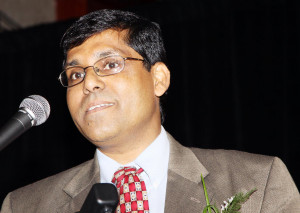
Sajal K. Das, Daniel St. Clair Endowed Chair, Department of Computer Science, Missouri University of Science and Technology, USA
Title: Securing Cyber-Physical and IoT Systems in Smart Living Environments
Abstract: Our daily lives are increasingly dependent on a variety of smart cyber-physical infrastructures, such as smart cities and buildings, smart energy grid, smart transportation, smart healthcare, etc. Alongside, smartphones and sensor-based IoTs are empowering humans with fine-grained information and opinion collection through crowdsensing about events of interest, resulting in actionable inferences and decisions. This synergy has led to the cyber-physical-social (CPS) convergence with human in the loop, the goal of which is to improve the “quality” of life. However, CPS and IoT systems are extremely vulnerable to failures, attacks and security threats. This talk will highlight unique research challenges in securing such systems, followed by novel defense mechanisms. Our proposed frameworks and solutions are based on a rich set of theoretical and practical design principles, such as secure data fusion, uncertainty reasoning, information theory, prospect theory, reputation scoring, and belief and trust models. Two case studies will be considered: (1) Security forensics and lightweight statistical anomaly detection in the smart grid CPS to defend against organized and persistent adversaries that can launch data falsification attacks on the smart meters using stealthy strategies. The novelty of our approach lies in a newly defined information-theoretic metric that helps quantify robustness and security, thus minimizing the attacker’s impact on the customers and utilities with low false alarm rates; (2) Secure and trustworthy decision making in mobile crowd sensing to detect false (or spam) contributions due to selfish and malicious behavior of users. Based on the cumulative prospect theory and reputation/trust model, our approach prevents revenue loss owing to undue incentives and improves the operational reliability and decision accuracy. The talk will be concluded with directions for future research.
Bio: Dr. Sajal K. Das, whose academic genealogy includes Thomas Alva Edison, is a Professor of Computer Science and Daniel St. Clair Endowed Chair at Missouri University of Science and Technology, where he was the Chair of Computer Science Department during 2013-2017. Prior to 2013, he was a University Distinguished Scholar Professor of Computer Science and Engineering, and founding director of the Center for Research in Wireless Mobility and Networking at the University of Texas at Arlington. During 2008-2011, Dr. Das served the National Science Foundation as a Program Director in the Computer and Network Systems Division. His research interests include wireless sensor networks, mobile and pervasive computing, smart environments (smart city, smart grid, smart healthcare), cyber-physical systems; IoT, crowdsensing, cloud computing, security and trustworthiness, and social networks. He has contributed significantly to these areas, having published more than 700 research articles in high quality journals and conferences, and 51 book chapters. A holder of 5 US patents, Dr. Das has directed numerous funded projects totaling over $16 million and coauthored four books – “Smart Environments: Technology, Protocols, and Applications” (John Wiley, 2005); “Handbook on Securing Cyber-Physical Critical Infrastructure: Foundations and Challenges” (Morgan Kaufman, 2012); “Mobile Agents in Distributed Computing and Networking” (Wiley, 2012); and “Principles of Cyber-Physical Systems: An Interdisciplinary Approach” (Cambridge University Press, 2018). According to DBLP, Dr. Das is one of the most prolific authors in computer science. His H-index is 83 with 28,000+ citations according to Google Scholar. He is the founding Editor-in-Chief of Elsevier’s Pervasive and Mobile Computing journal since 2005, and serves as an Associate Editor of several journals including IEEE Transactions on Mobile Computing, IEEE Transactions on Dependable and Secure Computing, and ACM Transactions on Sensor Networks. A founder of IEEE PerCom, WoWMoM, SMARTCOMP and ACM ICDCN conferences, Dr. Das has served as General and Program Chair of numerous conferences. He is a recipient of 10 Best Paper Awards in prestigious conferences, and numerous awards for teaching, mentoring and research including IEEE Computer Society’s Technical Achievement award for pioneering contributions to sensor networks and mobile computing. He graduated 41 PhD and 32 MS thesis students. Dr. Das is an IEEE Fellow.
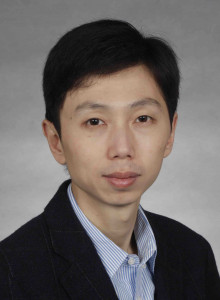
Yuan He, Associate Professor, School of Software, Tsinghua University, China
Title: Wireless for the Internet of Things: Past, Present, and Future
Abstract: Internet of Things (IoT) technology has gained dramatic development in the past decade. In the future, deployments of IoT will exist in almost everywhere and play an increasingly important role in the daily living and production space. As one of the major enabling technologies, wireless networks connect countless IoT devices, providing mobility, ease of deployment, and flexibility of connections. The research hotspots on wireless networks also change with the evolution of IoT applications. In this keynote, I will present the experience and insights obtained from the research on wireless sensor networks, wireless coexistence, and backscatter communication, discuss the key technical challenges, and share our view on the open problems.
Bio: Yuan He is an Associate Professor in the School of Software at Tsinghua University, China. He is also an affiliated member of Beijing National Research Center for Information Science and Technology. His research interests include Internet of Things (IoT), wireless networks, mobile and ubiquitous computing. He has been the research team leader of several well-known projects on large-scale wireless sensor networks, such as GreenOrbs and CitySee. He is currently leading the Pavatar project, which applies IoT technologies to the power industry. Yuan serves as TPC Chair/Track Chair of EWSN 2019, DCOSS 2018, ICPADS 2017 & 2018, Editorial Board member of ACM Transactions on IoT and the Journal of Ad Hoc & Sensor Wireless Networks, and TPC member of conferences like SenSys, IPSN, WWW, INFOCOM, ICDCS, SECON, IoTDI, and etc. He has three best paper awards and over 100 published papers at refereed conferences and journals, and received China’s National Natural Science Fund for Excellent Young Scientist in 2014. Yuan received his B.E. degree from University of Science and Technology of China, his M.E. degree from Chinese Academy of Sciences, and his Ph.D. degree from Hong Kong University of Science and Technology.
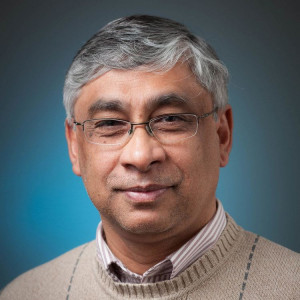
Hasan M. Jamil, Associate Professor, Department of Computer Science, University of Idaho
Title: Teaching, Learning and Mentoring Computational Thinking Online in Bangladesh for Younger Students and In-Service Professionals
Abstract: With the future likely to see even more pervasive computation, computational thinking (problem-solving skills incorporating computing knowledge) is now being recognized as a fundamental skill needed by all students. Computational thinking is conceptualizing as opposed to programming, promotes natural human thinking style than algorithmic reasoning, complements and combines mathematical and engineering thinking, and it emphasizes ideas, not artifacts. But teaching and mentoring for computational thinking is not an easy task, let alone doing
so online and fully automatically.
In the context of Bangladesh, we juxtapose the computer science for all programs in USA and Bangladesh and discuss how new smart learning tools such as MindReader, vTutor, CodeMapper and OpenSchool are reshaping mass teaching of computational thinking online. We also discuss how such systems potentially have a significant impact on self-learning and free-choice learning, and promote effective learning and discourage and guard against plagiarism by leveraging authentic assessment. We leave the audience with some food for thought on the direction Bangladesh might consider taking.
Bio: Hasan M. Jamil received the BS and MS degrees in applied physics and electronics from the University of Dhaka, Bangladesh, in 1982 and 1984, respectively, and the PhD degree in computer science from Concordia University, Canada, in 1996. His current research interests include the areas of databases, bioinformatics, natural language querying, knowledge representation, and intelligent user interfaces. In particular, he is interested in the management and querying of complex scientific and social data, their applications in novel and interesting analysis, data integration, and improving usability of large databases. He is an Associate Professor in the Department of Computer Science, University of Idaho. He was previously on the faculty of Macquarie University, Sydney, Australia, Mississippi State University, and Wayne State University. He is also a member of the Association for Computing Machinery, ACM Special Interest Group on Management of Data, the Association for Logic Programming, the International Society for Computational Biology, and the IEEE.
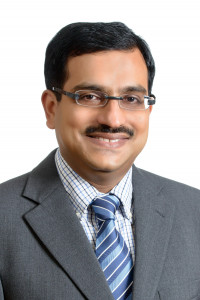
Abhik Roychoudhury, Professor, School of Computing, NUS
Title: Automated Program Repair
Abstract: Software systems, are prone to vulnerabilities which can be exploited. One of the key difficulties in building trustworthy software systems – is the lack of specifications, or intended behavior, or a description of how the software system is supposed to behave. In our work, we have developed semantic analysis techniques to extract or discover specifications from an erroneous or vulnerable program. Such a specification discovery process helps in automatically generating repairs, thereby moving closer to the goal of self-healing software systems. As more and more of our daily functionalities become software controlled, and with the impending arrival of technology like personalized drones, the need for self-healing software has never been greater. There exist exciting possibilities for combining semantics based repair approaches with search-based repair, and this is under investigation in our research team. We envision that automated repair capabilities should be integrated into programming environments in the future. We will also discuss the possibility of using automated repair for grading and teaching of introductory programming to various learner groups, and this is of particular interest to countries of the world which have a large young population.
Bio: Abhik Roychoudhury is a Professor of Computer Science at National University of Singapore. His research focuses on software testing and analysis, software security and trust-worthy software construction. His research group has built scalable techniques for testing, debugging and repair of programs using systematic semantic analysis. He has been an ACM Distinguished Speaker (2013-19). He is currently leading a large five-year long targeted research effort funded by National Research Foundation in the domain of trust-worthy software. He is the Lead Principal Investigator of the Singapore Cyber-security Consortium, which is a consortium of over 35 companies in the cyber-security space engaging with academia for research and collaboration. He has served as Program Chair of ACM International Symposium on Software Testing and Analysis (ISSTA) 2016 and Editorial Board member of IEEETransactions on Software Engineering (TSE) from 2014 to 2018. Abhik received his Ph.D. in Computer Science from the State University of New York at Stony Brook in 2000.
Invited Speakers
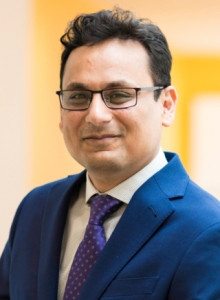
Ehsan Hoque, Assistant Professor, Computer Science, Interim Director of the Goergen Institute for Data Science, University of Rochester
Title: Upskilling the future workforce through Affective training
Abstract: Fifty percent of the current activities in the US are technically automatable by adapting existing technologies. For example, each industrial robot in manufacturing replaces six workers. As a result, most individuals favor limits on replacing jobs through automation. While demand for physical and manual labor is declining, there is a huge demand for a workforce with social-emotional and technological skills.
The workforce of the future will have to be creative and innovative, rather than merely good at performing specific tasks. But the problem is that any individuals lack these skills, particularly if they suffer from cognitive disabilities or difficulties. Many argue that those skills are either innate or require extensive practice with human experts.
In our ongoing work, we show an early promise of using technology to recognize the subtle nuances of soft behavioral skills and provide meaningful feedback to the participants whenever they want, wherever they want. We demonstrate that, artificial intelligence, when designed appropriately, can successfully aid individuals in tasks such as job interviews, public speaking, negotiations, working as part of a team, helping patients with Parkinson’s to monitor their symptoms, end-of-life communication between doctors and patients, and even routine social interactions for people with autism. In this talk, I will share our ideas on using AI to improve human ability with two guiding principles in mind: 1) augment human beings rather than replace them; 2) be mindful of the potential misuse by recommending policy and social implications.
Bio: Ehsan Hoque is an Asaro-Biggar (’92) Family Assistant Professor of Computer Science at the University of Rochester where he co-directs the Rochester Human-Computer Interaction (ROC HCI) Lab. He is also the interim director of the Goergen Institute for Data Science. Dr. Hoque’s research focuses on computationally modeling many facets of human communication, with applications in the future of skills, human ability and health.
Dr. Hoque earned his Ph.D. from the Massachusetts Institute of Technology in 2013, where his dissertation was highlighted by the MIT Museum as one of MIT’s most unconventional inventions. He has received an MIT Technology Review Top Innovators Under 35 Award in 2016, two Google Faculty Research Awards (2014, 2016), an NSF CAREER Award (2018), and four best-of-conference citations from IVA, UbiComp, FG, ACII. In 2017, Science News named him one of the one of ten early- to mid-career scientists to watch, and in 2018, he received the Early Career Award for Scientists and Engineers (ECASE)-the highest honor bestowed by the US Army Research Office for young scientists and engineers. He is an associate editor of IEEE Transactions on Affective Computing, PACM IMWUT, and Digital Biomarkers.
Follow his research group on social media (Twitter: @rochci; Facebook: facebook.com/ROChesterHCI)
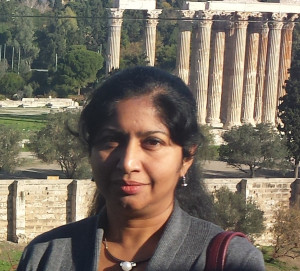
Farhana H. Zulkernine, PhD, PEng
Title: Big Data to Machine Intelligence
Abstract: The future of machine intelligence is continuously being paved by novel advancements in computing technology and rapid progress in data analytics. Analytical models help explore knowledge and empower decision support but the knowledge must be stored and linked efficiently to connect the relevant pieces for optimum decision support. Cognitive computing enhances human level recognition and linking of knowledge to improve service quality, but fundamentally, everything is made possible by data ingestion and processing systems. This talk will discuss the enablers of machine intelligence and present some of our work in this regard specifically on streaming multimodal data ingestion and processing, knowledge management system, machine learning, cognitive computing, and decision support.
Bio: Dr. Farhana Zulkernine is an Assistant Professor and the Director of the Big Data Analytics and Management (BAM) laboratory at the School of Computing, Queen’s University. She is also the Coordinator of the Cognitive Science Program. Her research interests include big data analytics and management, cognitive computing, and cloud computing. She has more than 15 years of international work experience in three continents in software design, analysis and research. She is a certified member of the Professional Engineers Ontario and a member of program committees of multiple international conferences including the Scientific Advisory Committee of the Southern Ontario Smart Computing Innovation Platform (SOSCIP). Researchers at BAM lab are trained on applying cutting edge computational tools to develop innovative big data frameworks and machine learning models for solving multidisciplinary industry relevant data science problems in medical diagnosis, engineering, and computer vision to create machine intelligence. Her research has been funded by NSERC, MITACS, CFI, SOSCIP, Canadian Institute for Military and Veteran Health Research (CIMVHR), Canadian Primary Care Sentinel Services Network (CPCSSN), Compute Canada and Centre for Advanced Computing (CAC). She works closely with industry partners such as IBM, R2i and Gnowit, and government partners such as the Local Health Integration Network, Ministry of Transportation and Ministry of Health and Long Term Care (MOHLTC) in Ontario.
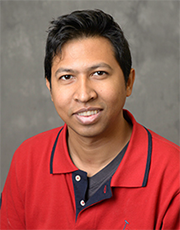
Dr. Md Munirul Haque, Regenstrief Center for Healthcare Engineering, Purdue University
Title: Data driven decision making in healthcare
Abstract: The talk will primarily focus on a current NIH funded study on identifying Hgb level using mobile phone-based eyelid imaging. Such a tool can be helpful for millions of people suffering from anemia in developing countries especially pregnant women (Almost two-thirds of pregnant women in Africa suffers from anemia). The presenter will also provide an overview of other global mHealth projects led by Regenstrief Center for Healthcare Engineering in the area of autism, sickle cell, MCH (Maternal and Child Health) and the use of informatics and data science in these projects. Finally, the presenter will show several healthcare datasets and possible use of data analytics in solving clinically meaningful research questions.
Bio: Dr. Md Munirul Haque received his PhD in Computational Sciences from Marquette University and joined Regenstrief Center for Healthcare Engineering, Purdue University in 2014 as Research Scientist. He has years of experience in the area of m-Health, medical informatics, and HCI (Human Computer Interaction). Dr. Haque is leading several multidisciplinary research efforts in health care systems that involve millions of records of data. The research projects are typically distributed in the area of prediction modeling (sepsis, diabetes, outcome of early extubation, hemoglobin level measurement), forecasting/risk analysis (HIV adherence, healthcare commodity stock management) and long term data collection and analysis for chronic conditions (Autism Spectrum Disorder, mental health). The projects involve collaboration from Computer Science, BME, Statistics, Industrial Engineering, Nursing and Actuarial Science. Dr. Haque is also a core member of REMEDI (Regenstrief National Center for Medical Device Informatics) group that owns the nation’s (USA) leading medical device data acquisition and management platform. Dr. Haque has received funding from NIH, USAID, and Gates Foundation for his research work.


